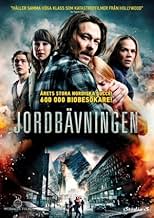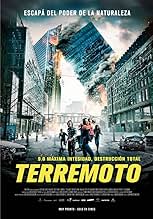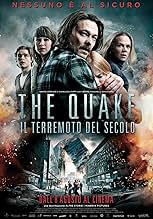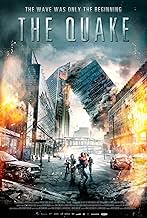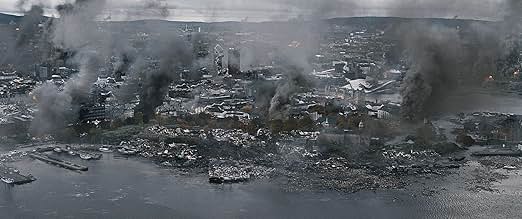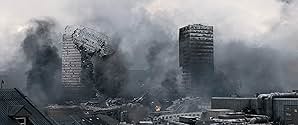"1904, un tremblement de terre à 5,4 sur l'échelle Richter secoue Oslo, avec ""Osle Graben"" comme épicentre qui court en dessous de la capitale norvégienne. Il y a des signes comme quoi on ... Tout lire"1904, un tremblement de terre à 5,4 sur l'échelle Richter secoue Oslo, avec ""Osle Graben"" comme épicentre qui court en dessous de la capitale norvégienne. Il y a des signes comme quoi on pourra s'attendre à un tremblement de terre important au futur.""1904, un tremblement de terre à 5,4 sur l'échelle Richter secoue Oslo, avec ""Osle Graben"" comme épicentre qui court en dessous de la capitale norvégienne. Il y a des signes comme quoi on pourra s'attendre à un tremblement de terre important au futur."
- Réalisation
- Scénario
- Casting principal
- Récompenses
- 2 victoires et 7 nominations au total
- Johannes Løberg
- (as Stig Amdam)
- Ingrid
- (as Ingvild Haugstad Gundersen)
- Reporter VG-TV
- (as Mads A Andersen)
Avis à la une
In fact with a few minor changes, the basic narrative outline from The Wave is rejigged, to be used again in The Quake. So despite being a (PTSD affected) hero from events seen in The Wave, three years earlier, Kristtofer Joner is back playing Kristian, a Jonah like figure again whose warnings about a cataclysmic earthquake event, likely to strike Oslo, Norway's capitol, seem to be going unheeded. Things don't really seem to have changed a lot and everything looks quite predictable, apart from the central location changing from the fjord at Geiranger to downtown Oslo, where Kristian's family has moved to, after leaving him, because of his continual depression. Once again Idun, Kristian's plucky but separated wife, is notably working for the Radisson Hotel chain (It surely must be a franchise sponsor).
Many others have offered mixed commentary on the rather long events leading up to the actual quake. Like the earlier film, we have one of Kristian's friends and colleague falling foul of preliminary action. This allows the entry of Marit, his daughter into proceedings and yes, she is kind of like a younger and darker-haired plucky version of Idun.
No criticism of Kristtofer Joner's acting prowess, but I just found it hard to accept that the hero of Geiranger, seemed to be allowed to wallow in hermetic depression, supposedly blaming himself for the fate of those who died there, without any visible means of support from the well-regarded Norwegian social welfare system. One of the things that made The Wave so good, was its realism. The action took place in real places and was based on real events that had occurred in a similar fjord. The Quake tries to sell us the same story about Oslo, being the Nordic equivalent of San Francisco or Tokyo; a city sitting on the edge of a geologic precipice that could topple at any moment. But it just doesn't have the same ring of truth. Despite the pre and post credit notes, I just never recall Oslo being in the news for being continually affected by earthquakes (on a minor scale of course).
When the big split finally happens, it's again handled onscreen technically very well. But sad to see, the major narrative point hinged on the imposition again of the "naughty child syndrome", where Julia, Kristtian's and Idun's angelic daughter, bizarrely does exactly the opposite of what her father tells her to do, which is remain in the car with Marit. Again I found it totally unbelievable, that given this intelligent kid's earlier experiences, she would suddenly have this irrational yen to sightsee from the top of her mother's workplace. If it sounds stupid, it actually looked pretty dumb up there on the screen, being played out as such.
Another problem arising from having the earthquake occur so late in the piece, is that unlike The Wave where we see the tsunami affect the whole town, here we just end up focusing on 4 or 5 people. Strangely, events affecting Sondre, Julia's brother, at his university appear extremely abbreviated, so much so, that it's almost as if he and his girlfriend are forgotten about.
I have to reiterate that it's great to see smaller countries not being intimidated and giving big budget-themed movies a shot. But I have to confess that I'm a little surprised that The Quake has gained such a strong collection of well regarded reviews. I consider it it a fairly obviously inferior film to its prequel, due mainly to its lack of originality and can only give it 5.5/10.
However, Kristian is suffering from severe trauma and depression, directly related to that disaster. He has even separated himself from his wife Idun (Ane Dahl Torp) and his two children.
Kristian, via a colleague's death, begins to realize there could be another disaster, a major earthquake, about to strike Oslo. As other reviewers have mentioned, the build-up to the disaster is extremely slow and is filled with lots of melodrama and overacting.
It's only in the final third of the movie that things pick up dramatically with some high tension and truly horrific scenes worthy of a disaster flick. Overall, if one can have the patience to stick with this movie I believe it's worth a watch.
Le saviez-vous
- AnecdotesThis movie taking place three years since the end of the first film.
- GaffesWhen they say that from a quake of magnitude 6 to 8, it's not a factor of two but 1 million, it's wrong. 1 unit of magnitude difference is 32 times. So here a magnitude 8 is 1,024 times more powerful than a magnitude 6, not 1 million. That would be a difference of 4 magnitudes.
- Citations
Idun Karlsen: What don't I understand? I was in Geiranger too. You did everything you could. You saved many people. And your family survived. We were fortunate. We're here. All of us.
- ConnexionsFeatured in WatchMojo: The Best Disaster Movies of All Time from A to Z (2020)
Meilleurs choix
Détails
- Date de sortie
- Pays d’origine
- Site officiel
- Langue
- Aussi connu sous le nom de
- Le tremblement de terre
- Lieux de tournage
- Société de production
- Voir plus de crédits d'entreprise sur IMDbPro
Box-office
- Budget
- 52 100 000 NOK (estimé)
- Montant brut aux États-Unis et au Canada
- 6 235 $US
- Week-end de sortie aux États-Unis et au Canada
- 3 256 $US
- 16 déc. 2018
- Montant brut mondial
- 13 837 294 $US
- Durée1 heure 46 minutes
- Couleur
- Mixage
- Rapport de forme
- 2.35 : 1
Contribuer à cette page





